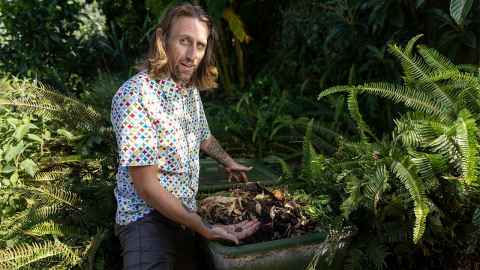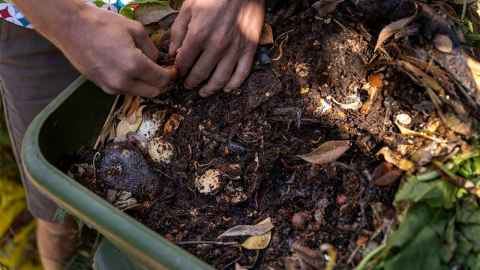Seven tips to reduce food waste
4 July 2022
By forming new habits, you can reduce your food bill, cut down on waste to landfill and restore nutrients to the soil. Waste minimisation specialist Mark Neal has seven tips.

1. Plan meals and write a shopping list
By planning meals for the week and writing a list before you do your groceries, you’ll reduce food waste because you shouldn’t be buying anything that’s not in the plan.Try cooking several meals that use the same ingredient. For instance, think of two or three ways to use a cooked chicken, or plan to roast a whole pumpkin and then use it for soups and salads.
2. Shop at a local market
Shopping at a local farmers’ market means you’re more likely to buy produce picked recently. It will be fresher than produce stored in a supermarket’s cold stores, so will last longer. It’s also likely to be tastier than supermarket produce picked before ripening (especially if coming from offshore) and which may be artificially ripened. Shopping local means you’re buying in season and supporting a local supplier.
3. Store it well
Not all fruit and vegetables like being stored in the fridge but, in general, vegetables will last longer in the fridge vegetable bin. Although some produce will keep longer in the fridge, some nutrients will be lost. Tired of throwing out avocados? You may have seen a simple food hack online: store whole avocados immersed in a bowl of water in the fridge, to make them last. For dry food, buy it from bulk bins and store in airtight, reusable containers. This will reduce unnecessary packaging and lengthen its life.

Composting organic food scraps is one of the most effective ways to reduce waste going to landfill, and to return nutrients to the soil.
4. Understand ‘best before’ and ‘use by’ dates‘
Best before’ is the date the produce is at its best, but this can be confusing and lead to food being thrown out unnecessarily. As long as the best-before date isn’t too far in the distant past, it can still be used. A ‘use by’ date is more imperative and used for perishables such as meat and fish. If you’re running close to this date, just put it in the freezer.
5. Get inventive with your cooking
We all have favourite meals we can cook on auto-pilot. But try being a bit inventive, using new ingredients that are in season or readily available. Search recipes on the internet by googling the ingredients you have to hand or use a recipe site where you input your ingredients and a recipe will be suggested. And, because we often learn best by watching, tap into the knowledge of a friend or family member who loves to cook.
6. Compost
Composting organic food scraps is one of the most effective ways to reduce waste going to landfill, and to return nutrients to the soil. There are plenty of options for those willing to make a positive change (and not all involve worms). It shouldn’t be hard to find free composting workshops and advice on a composting system to suit your needs, such as through the Compost Collective (compostcollective.org.nz), which offers free composting workshops. For general information, try compostfoundation.org or the internationalcompostalliance.com.
If composting isn’t your thing, why not send your food scraps elsewhere? Share Waste (sharewaste.com) is a global initiative to find other people to compost your scraps. Or there’s the Bokashi method, which ferments kitchen scraps, including meat, into a soil builder. Bokashi is great for anyone living in an apartment as it is done in a small bucket and can be kept inside. Find info at planetnatural.com.
7. Grow your own food
In my experience, this is one of the best ways to reduce food waste. The time and effort it takes to grow a seed into something that feeds you gives you a connection to what you are eating.
Personally, it puts me off wasting what I have toiled to keep alive. You don’t even need a lot of space. Some things, such as micro-greens and herbs, can be grown inside and don’t even need a garden. Start with something easy – tomatoes in summer and spinach or kale in autumn/winter. Not only will you reduce your food bill, but you’ll also find the food tastes a lot better when you’ve grown it yourself.
Use the compost you’ve created and your plants will love you for it. Most cities have community gardens where you can volunteer or attend workshops to learn more.
More New Zealand information on reducing food waste can be found at lovefoodhatewaste.co.nz
Mark Neal is a Waste Minimisation Specialist for Property Services at the University of Auckland.
This article first appeared in the Autumn 2022 edition of Ingenio magazine.